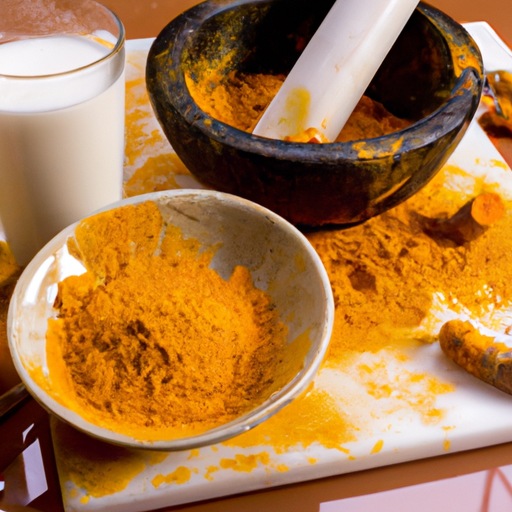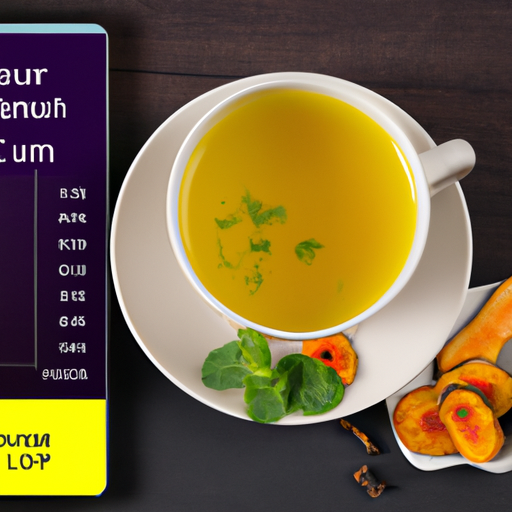Have you ever wondered if you can simply add turmeric to your tea and reap the benefits? Well, the answer is a resounding yes!
Adding turmeric to your tea not only adds a vibrant golden hue, but it also infuses your beverage with a plethora of health benefits. Turmeric, known for its active compound curcumin, is a powerful antioxidant and anti-inflammatory agent that has been linked to a range of health benefits, from boosting immune function to reducing inflammation.
In this article, I will explore the benefits of adding turmeric to your tea, discuss the types of tea that pair well with turmeric, provide a simple turmeric tea recipe, and offer expert tips for brewing the perfect cup. Additionally, I will explore other creative ways to incorporate turmeric into your tea and address any potential side effects or precautions.
So, grab your favorite mug and get ready to embrace the benefits of turmeric-infused tea!
Key Takeaways
- Turmeric can be added to tea to provide a golden hue and health benefits.
- Turmeric contains curcumin, an active compound with antioxidant and anti-inflammatory properties.
- Turmeric can boost immune function and reduce inflammation.
- It is important to be cautious when incorporating turmeric into tea due to potential side effects and interactions with certain medications.
Benefits of Adding Turmeric to Your Tea
You’ll love how adding a sprinkle of turmeric to your tea creates a vibrant golden hue, infusing your cup with a warm and earthy aroma that invigorates your senses.
Not only does turmeric enhance the visual and olfactory experience, but it also brings a host of potential health benefits. Research suggests that turmeric has anti-inflammatory properties and may help with digestion, skin health, and immune function. However, it’s important to note that high doses of turmeric can have potential health risks and may interact with certain medications.
The recommended daily dosage of turmeric is generally around 500-2000 milligrams, but it’s always best to consult with a healthcare professional to determine the appropriate amount for you.
Now, let’s explore the types of tea that go well with turmeric, allowing you to enjoy both flavor and potential health benefits simultaneously.
Types of Tea That Go Well With Turmeric
Pairing turmeric with different types of tea can create a delightful and health-boosting experience. When it comes to types of herbal tea with turmeric, the possibilities are endless.
Here are three options to consider:
-
Ginger Turmeric Tea: The combination of ginger and turmeric not only creates a warm and spicy flavor but also enhances the anti-inflammatory properties of both ingredients.
-
Green Tea with Turmeric: This combination brings together the antioxidant benefits of green tea with the anti-inflammatory and digestion-supporting properties of turmeric.
-
Chamomile Turmeric Tea: Chamomile tea is known for its calming effects, and when combined with turmeric, it offers an extra boost of anti-inflammatory and immune-boosting properties.
Adding turmeric to these teas not only adds a vibrant color but also enhances their health benefits.
Now, let’s move on to a simple turmeric tea recipe that you can try at home.
Simple Turmeric Tea Recipe
To make a simple turmeric tea, you’ll need basic ingredients such as turmeric powder, water, black pepper, honey or lemon, and optional ingredients like ginger or cinnamon.
The step-by-step instructions are easy to follow. First, boil water and add turmeric powder, black pepper, and any optional ingredients. Simmer for 10 minutes, strain the tea, and sweeten with honey or lemon if desired.
This recipe provides a convenient way to incorporate turmeric into your daily routine and enjoy its potential health benefits.
Basic Ingredients
When making tea, consider incorporating turmeric as a basic ingredient for added flavor and health benefits. Turmeric is a versatile spice that’s long been used in various recipes, including teas. Not only does it add a warm and earthy flavor to your tea, but it also offers numerous health benefits.
Turmeric contains a compound called curcumin, which’s known for its anti-inflammatory and antioxidant properties. Studies have shown that curcumin may help reduce the risk of chronic diseases, such as heart disease, cancer, and diabetes. Additionally, it may also aid in digestion and improve immune function.
To include turmeric in your tea, simply add a pinch or two of ground turmeric to hot water or your favorite tea blend. This’ll give your tea a vibrant golden color and a mild, slightly spicy taste.
Now, let’s move on to the step-by-step instructions on how to make turmeric tea.
Step-by-Step Instructions
Now, let’s dive into the step-by-step process of how to whip up a comforting and immune-boosting cup of golden turmeric tea, guaranteed to soothe both your body and soul.
-
Start by boiling 2 cups of water in a small saucepan.
-
Add 1 teaspoon of ground turmeric to the boiling water and let it simmer for 10 minutes to allow the flavors to infuse.
-
While the tea is simmering, you can enhance its taste and health benefits by adding a pinch of black pepper, a squeeze of lemon juice, and a drizzle of honey.
-
Once the tea is ready, strain it into a cup and enjoy the warm and aromatic beverage.
Turmeric tea is not only delicious but also packed with numerous health benefits. Curcumin, the active compound in turmeric, has powerful anti-inflammatory and antioxidant properties, which can help reduce inflammation, boost immunity, and support overall well-being.
Now, let’s move on to the next section and explore some expert tips for brewing turmeric tea.
Expert Tips for Brewing Turmeric Tea
When brewing turmeric tea, it’s crucial to maintain the proper turmeric-to-water ratio to achieve the desired flavor and health benefits. Adding spices and sweeteners can enhance the overall taste of the tea, allowing for a more enjoyable drinking experience. Additionally, paying attention to the brewing time and temperature ensures that the tea is steeped correctly, maximizing the release of turmeric’s active compounds.
Proper Turmeric-to-Water Ratio
Sure, go ahead and add a pinch of turmeric to your tea for a warm and vibrant flavor! When it comes to the turmeric-to-water ratio, it’s important to find the right balance.
A general rule of thumb is to use about 1/4 teaspoon of turmeric powder for every 8 ounces of water. However, this can vary depending on personal preference and desired intensity. If you’re new to turmeric, you may want to start with a smaller amount and gradually increase it to find your perfect dosage.
Additionally, feel free to experiment with different variations of turmeric tea, such as adding ginger or black pepper for added health benefits.
Now, let’s move on to enhancing the flavor of your turmeric tea with spices and sweeteners.
Enhancing Flavor with Spices and Sweeteners
Now that we’ve established the proper turmeric-to-water ratio, let’s talk about how to enhance the flavor of your turmeric tea. Adding spices and sweeteners can take your tea to the next level, both in terms of taste and aroma.
Spices like ginger, cinnamon, and cardamom not only add complexity to the flavor profile but also complement the earthy notes of turmeric. Sweeteners like honey or maple syrup can help balance the slight bitterness of turmeric.
To give you an idea of the possibilities, here’s a table showcasing some popular spice and sweetener combinations for turmeric tea:
| Spices | Sweeteners |
|---|---|
| Ginger | Honey |
| Cinnamon | Maple syrup |
| Cardamom | Stevia |
| Black pepper | Coconut sugar |
In addition to enhancing the taste, these spices and sweeteners can also provide additional health benefits.
Now that we’ve explored flavor enhancements, let’s move on to discussing the optimal brewing time and temperature for your turmeric tea.
Brewing Time and Temperature
To achieve the perfect balance of flavors in your turmeric brew, it’s crucial to steep it at the precise temperature and duration, like a seasoned alchemist concocting a magical potion.
Brewing techniques play a significant role in maximizing the health benefits of turmeric tea. Here are some key considerations:
-
Temperature: Heat water to around 180°F (82°C) to preserve the delicate flavors and beneficial compounds of turmeric.
-
Steeping Time: Let the tea steep for 10-15 minutes to ensure optimal extraction of turmeric’s bioactive compounds.
This careful brewing process allows the tea to release its vibrant color, earthy aroma, and rich flavor profile. By following these techniques, you can fully enjoy the potential health benefits of this ancient spice.
Moving forward, let’s explore other creative ways to incorporate turmeric into your tea, expanding its versatility and culinary possibilities.
Other Creative Ways to Use Turmeric in Tea
You might be surprised at the other creative ways you can use turmeric in your tea! In addition to simply adding turmeric powder to your tea, you can also try making turmeric latte variations or turmeric tea mocktails.
These variations offer a unique twist to your regular cup of tea and can be a delightful change of pace. Turmeric latte variations often include ingredients like ginger, cinnamon, and honey, which complement the earthy flavor of turmeric.
On the other hand, turmeric tea mocktails can incorporate fruits, herbs, or even sparkling water to create a refreshing and flavorful beverage. These creative concoctions not only provide the health benefits of turmeric but also offer a delicious and enjoyable tea-drinking experience.
However, it’s important to remember that turmeric may have potential side effects and precautions, which we will explore in the next section.
Potential Side Effects and Precautions
Be cautious and prioritize your health when incorporating turmeric into your tea, as it’s important to be aware of the potential side effects and precautions associated with its consumption.
While turmeric is generally safe for most people when consumed in moderation, it can interact with certain medications, including blood thinners and stomach acid reducers. It’s essential to consult with your healthcare provider if you take any medications regularly to avoid potential drug interactions.
Additionally, excessive amounts of turmeric may cause gastrointestinal issues such as stomach upset or diarrhea. The recommended dosage of turmeric for most adults is 400-600 milligrams three times a day. Remember to start with a lower dose and gradually increase it if needed.
With these precautions in mind, you can safely enjoy the many benefits of turmeric-infused tea.
Embrace the benefits of turmeric-infused tea without hesitation.
Conclusion: Embrace the Benefits of Turmeric-Infused Tea
Indulge in the comforting warmth and vibrant flavors of turmeric-infused tea, savoring the invigorating boost it brings to both body and mind. Turmeric tea offers a multitude of benefits that make it a worthwhile addition to your daily routine.
One of the key advantages is its potential anti-inflammatory properties. Curcumin, the active compound in turmeric, has been shown to help reduce inflammation in the body. This can be particularly beneficial for individuals dealing with conditions such as arthritis or chronic pain.
Additionally, turmeric tea is rich in antioxidants, which can help protect the body against damage from harmful free radicals.
Overall, incorporating turmeric-infused tea into your diet can provide a natural and delicious way to support your overall well-being.
Frequently Asked Questions
Are there any specific brands of turmeric that are recommended for adding to tea?
There are several recommended turmeric brands for adding to tea, such as Organic India, Gaia Herbs, and Nature’s Way. Turmeric tea offers numerous health benefits, including anti-inflammatory properties and potential immune-boosting effects.
Can I add milk or sweeteners to my turmeric tea?
Yes, you can add milk alternatives like almond or coconut milk to your turmeric tea for a creamy texture. Alternative sweeteners such as honey or maple syrup can be used to enhance the flavor.
Can I use fresh turmeric instead of powdered turmeric in my tea?
Using fresh turmeric in tea offers numerous benefits. It enhances the flavor and provides a higher concentration of beneficial compounds. Try incorporating it into your turmeric tea recipes for a more potent and enjoyable experience.
Can turmeric tea help with weight loss?
Turmeric tea can potentially aid in weight loss due to its anti-inflammatory and antioxidant properties. It may help boost metabolism and reduce fat accumulation. However, it’s important to note that results may vary and a balanced diet and exercise are also crucial for weight loss.
Is it safe to consume turmeric tea while pregnant or breastfeeding?
It is generally safe to consume turmeric tea while pregnant or breastfeeding, but it is important to consult with a healthcare provider. Turmeric tea has health benefits, such as anti-inflammatory properties, but it can also have potential side effects.
Conclusion
In conclusion, incorporating turmeric into your tea can provide numerous health benefits. Studies have shown that turmeric has anti-inflammatory and antioxidant properties, which can aid in reducing inflammation and fighting free radicals in the body. Additionally, turmeric has been linked to improved digestion and enhanced brain function.
One example is a case study where a regular tea drinker experienced a decrease in joint pain and improved cognitive function after adding turmeric to their daily tea routine. However, it’s important to consult with a healthcare professional before making any significant changes to your diet.










